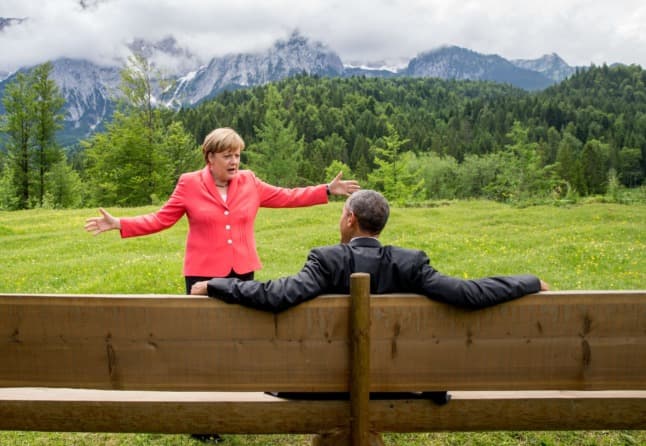Germany to once again host G7 leaders at Alpine castle

Germany will invite world leaders back to the Bavarian Alps when it hosts the next G7 summit next June at Elmau Castle, state leader Markus Söder said Tuesday.
Chancellor Olaf Scholz will welcome leaders of the world's most industrialised nations on June 26-28 at the same five-star resort used during Germany's last G7 presidency in 2015, Söder told reporters.
"That pleases us greatly and we will try to be good hosts," Söder said.
"We are thrilled the whole world is coming to Bavaria."
Government spokesman Steffen Hebestreit later confirmed the choice, saying the venue "fulfils all logistical and security requirements for a G7 summit".
The last meeting there saw former chancellor Angela Merkel, who left office last week, lead then US President Barack Obama on a village walkabout among farmers in the feathered caps and women in the dirndl smocks of Bavaria's famous traditional dress.
The two were captured in a meme-ready photo with Merkel's arms spread wide against a foggy Alpine backdrop, as Obama listened intently seated in front of her on a bench.
READ ALSO: German media heaps praise on Merkel during summit
G7 hosts typically choose picture-postcard spots when planning their annual summit, ideally in a remote location that is easier for police to secure than
an urban centre.
Protestant theologian and philosopher Johannes Mueller built Elmau Castle during World War I and when Adolf Hitler rose to power in 1933, Mueller
pledged allegiance to the Nazi leader although he never joined the party.
Schloss Elmau served as a US army hospital and later as a refuge for displaced people and Holocaust survivors in the immediate post-war years.
It now frequently hosts wellness retreats and cross-cultural events including lectures and debates.
Britain held the G7 presidency this year and hosted the leaders' meeting in June in Cornwall, southwest England.
Comments
See Also
Chancellor Olaf Scholz will welcome leaders of the world's most industrialised nations on June 26-28 at the same five-star resort used during Germany's last G7 presidency in 2015, Söder told reporters.
"That pleases us greatly and we will try to be good hosts," Söder said.
"We are thrilled the whole world is coming to Bavaria."
Government spokesman Steffen Hebestreit later confirmed the choice, saying the venue "fulfils all logistical and security requirements for a G7 summit".
The last meeting there saw former chancellor Angela Merkel, who left office last week, lead then US President Barack Obama on a village walkabout among farmers in the feathered caps and women in the dirndl smocks of Bavaria's famous traditional dress.
The two were captured in a meme-ready photo with Merkel's arms spread wide against a foggy Alpine backdrop, as Obama listened intently seated in front of her on a bench.
READ ALSO: German media heaps praise on Merkel during summit
G7 hosts typically choose picture-postcard spots when planning their annual summit, ideally in a remote location that is easier for police to secure than
an urban centre.
Protestant theologian and philosopher Johannes Mueller built Elmau Castle during World War I and when Adolf Hitler rose to power in 1933, Mueller
pledged allegiance to the Nazi leader although he never joined the party.
Schloss Elmau served as a US army hospital and later as a refuge for displaced people and Holocaust survivors in the immediate post-war years.
It now frequently hosts wellness retreats and cross-cultural events including lectures and debates.
Britain held the G7 presidency this year and hosted the leaders' meeting in June in Cornwall, southwest England.
Join the conversation in our comments section below. Share your own views and experience and if you have a question or suggestion for our journalists then email us at [email protected].
Please keep comments civil, constructive and on topic – and make sure to read our terms of use before getting involved.
Please log in here to leave a comment.